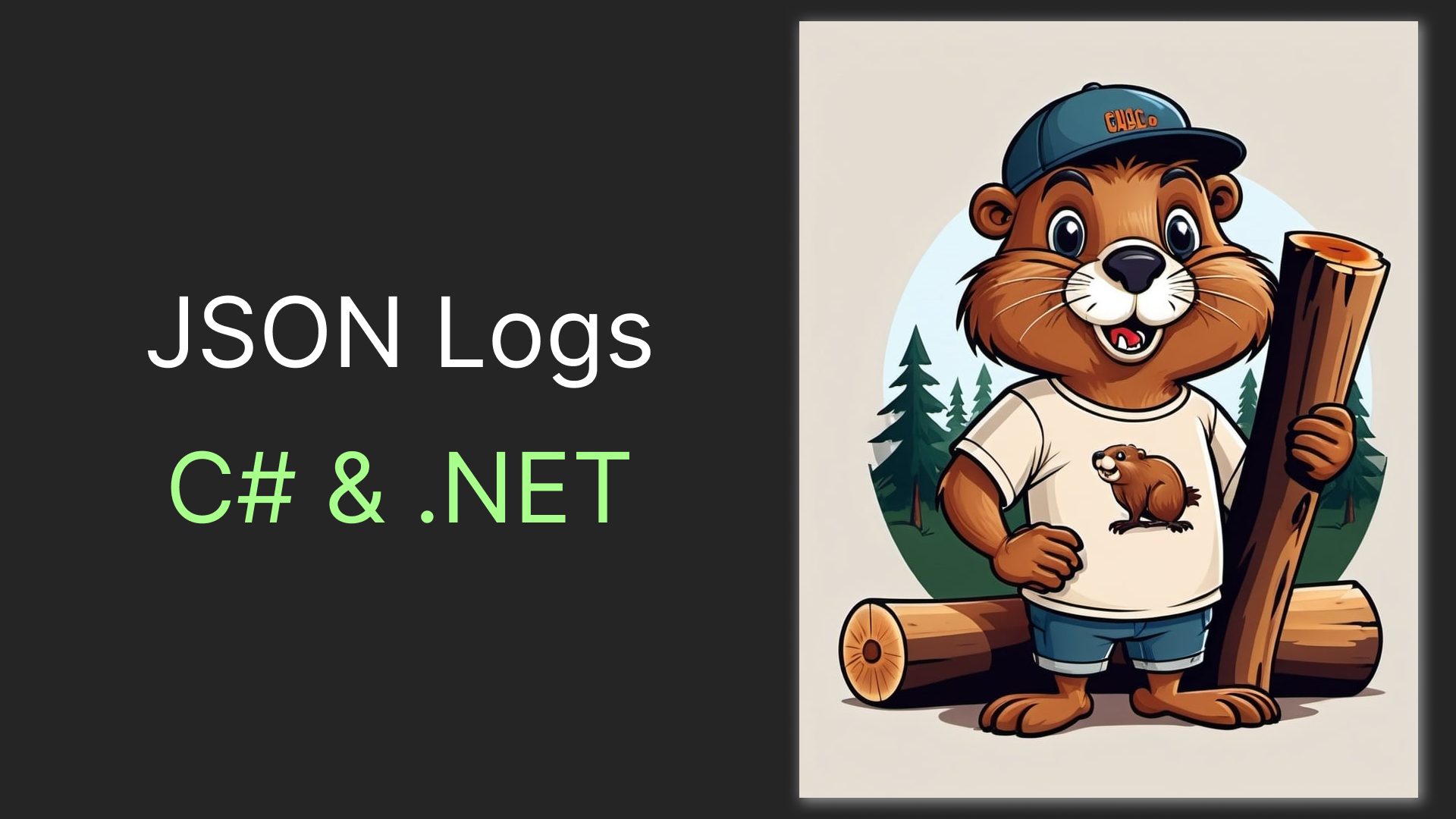JSON Logs in C# and .NET
How do you get the most out of your logs? Using structured logs shipped to an observability stack! And perhaps, the most popular shipping format is JSON. Therefore, since .NET 6 we can AddJsonConsole as a logging provider. In this article, we will investigate how it works exactly, check out different logs we can get, and learn just one more thing. So, straight to the code!

The Basics
The logging functionality is not specific to ASP .NET Core and works the same for any .NET project type. So let's spin up the most basic one by running:
dotnet new consoleHowever, unlike with ASP .NET Core, console apps don't include this functionality out of the box. So we'll need to install a separate nuget package:
dotnet add package Microsoft.Extensions.Logging.ConsoleSpinning up a logger is a surprisingly twisted process in .NET. In fact, it's twisted so much, that the most simple way to do it is by elaborating Microsoft.Extensions.DependencyInjection. Here's what the most basic code looks like:
The console log provider seems to ship with some sort of delay, so for logs to actually appear we will wait for 100 milliseconds before exiting.
using Microsoft.Extensions.DependencyInjection;
using Microsoft.Extensions.Logging;
var logger = new ServiceCollection()
.AddLogging(l => l.AddJsonConsole())
.BuildServiceProvider()
.GetRequiredService<ILogger<Program>>();
logger.LogInformation("{Name} {Age}", "Egor", 27);
await Task.Delay(100); // Wait for logs to be writtenIf we dotnet run the code we'll get the following JSON
This log is formatted for readability. The actual JSON log will be written in a single line. However, you can get the JSON formatted by changing the code to the following:
l.AddJsonConsole(c => c.JsonWriterOptions = new () { Indented = true })
{
"EventId": 0,
"LogLevel": "Information",
"Category": "object",
"Message": "Egor 27",
"State": {
"Message": "Egor 27",
"Name": "Egor",
"Age": 27,
"{OriginalFormat}": "{Name} {Age}"
}
}Nested Objects
Now let's spice things up a little bit! What if don't just log primitives, but some objects? Let's create one:
var egor = new Person("Egor", 28);
record Person(string Name, int Age);And to make things even more interesting let's say we have some information that initially came to us as JSON e.g. as a request body and we don't know a type of it. Fortunately, JsonSerializer supports deserializing this json as an object, which will actually be a JsonElement. Here's how we will imitate that:
var hobby = JsonSerializer.Deserialize<object>("{\"Name\":\"Board Games\"}");Logger is happy to accept any object as a parameter, so let's submit our information for it to log:
logger.LogInformation("{Person} {Hobby}", egor, hobby);This is the log we'll get now:
{
"EventId": 0,
"LogLevel": "Information",
"Category": "Program",
"Message": "Person { Name = Egor, Age = 28 } {\u0022Name\u0022:\u0022Board Games\u0022}",
"State": {
"Message": "Person { Name = Egor, Age = 28 } {\u0022Name\u0022:\u0022Board Games\u0022}",
"Person": "Person { Name = Egor, Age = 28 }",
"Hobby": "{\u0022Name\u0022:\u0022Board Games\u0022}",
"{OriginalFormat}": "{Person} {Hobby}"
}
}The peculiar thing about this is that we are not getting any nested JSON objects. Moreover, we got different representations of Person and hobby. But if we run JsonSerializer.Serialize on those objects we will in fact get them as nested objects. So, what's going on here? To figure this out, let's study the code of the JsonConsoleFormatter.cs. Here's the important part:
private static void WriteItem(Utf8JsonWriter writer, KeyValuePair<string, object> item)
{
string key = item.Key;
switch (item.Value)
{
case bool flag:
writer.WriteBoolean(key, flag);
break;
case byte num1:
writer.WriteNumber(key, (int) num1);
break;
// 9 different num cases omitted for brievity
case short num10:
writer.WriteNumber(key, (int) num10);
break;
case ushort num11:
writer.WriteNumber(key, (int) num11);
break;
case null:
writer.WriteNull(key);
break;
default:
writer.WriteString(key, JsonConsoleFormatter.ToInvariantString(item.Value));
break;
}
}
private static string ToInvariantString(object obj)
{
return Convert.ToString(obj, (IFormatProvider) CultureInfo.InvariantCulture);
}What this essentially means is that if we don't recognize an item as a primitive type we will just run a ToString() on it and return the received value, not allowing a complex analysis on nested data.
Can we do better?
Fortunately, there's another nuget called Astor.Logging providing us with another version of JSON Console logging. Let's check it out!
dotnet add package Astor.LoggingThe package is fully compatible with Microsoft's dependency injection system, so the only line we will need to change is this:
.AddLogging(l => l.AddMiniJsonConsole())Plus, add
using Astor.Logging, of course.
And here's the log we get with that package right away:
{
"person": {
"name": "Egor",
"age": 28
},
"hobby": {
"Name": "Board Games"
}
}So now, we don't just get the nested objects. We also made our logs significantly more minimalistic, hence the Mini in the name. But what if we need some metadata? Let's use IncludeAll in the logger configuration. Also, notice that the logger using a camel case by default. This can also be configured with SetNamingPolicy. Let's use JsonNamingPolicy.KebabCaseLower just for fun. And finally, let's Indent this thing. So here's the code we got:
.AddLogging(l => l.AddMiniJsonConsole(j =>
j.IncludeAll().Indent().SetNamingPolicy(JsonNamingPolicy.KebabCaseLower)))And here's the log:
Note that for
hobbyinitial json casing is preserved.
{
"person": {"name":"Egor","age":28},
"hobby": {"Name":"Board Games"},
"log-original-format": "{Person} {Hobby}",
"log-category-name": "Program",
"log-level": "Information",
"log-event-id": 2,
"log-message": "Person { Name = Egor, Age = 28 } {\u0022Name\u0022:\u0022Board Games\u0022}"
}Wrapping Up
Adding JSON logs in a .net application is as easy as
logging.AddJsonConsole();However, you'll get a log overstuffed with metadata and with no nesting capabilities
{
"EventId": 0,
"LogLevel": "Information",
"Category": "object",
"Message": "Egor { Name = Board Games, Favorite = Resistance }",
"State": {
"Message": "Egor { Name = Board Games, Favorite = Resistance }",
"Name": "Egor",
"Hobby": "{ Name = Board Games, Favorite = Resistance }",
"{OriginalFormat}": "{Name} {Hobby}"
}
}But to get a minimalistic log with inner objects where you need them, like:
{
"name": "Egor",
"hobby": {"name":"Board Games","favorite":"Resistance"}
}You'll just need to
dotnet add package Nist.LogsAnd update your code to
logging.AddMiniJsonConsole();...
By the way... 👉👈
Clap along if you feel like you'll use the JSON logs 👏